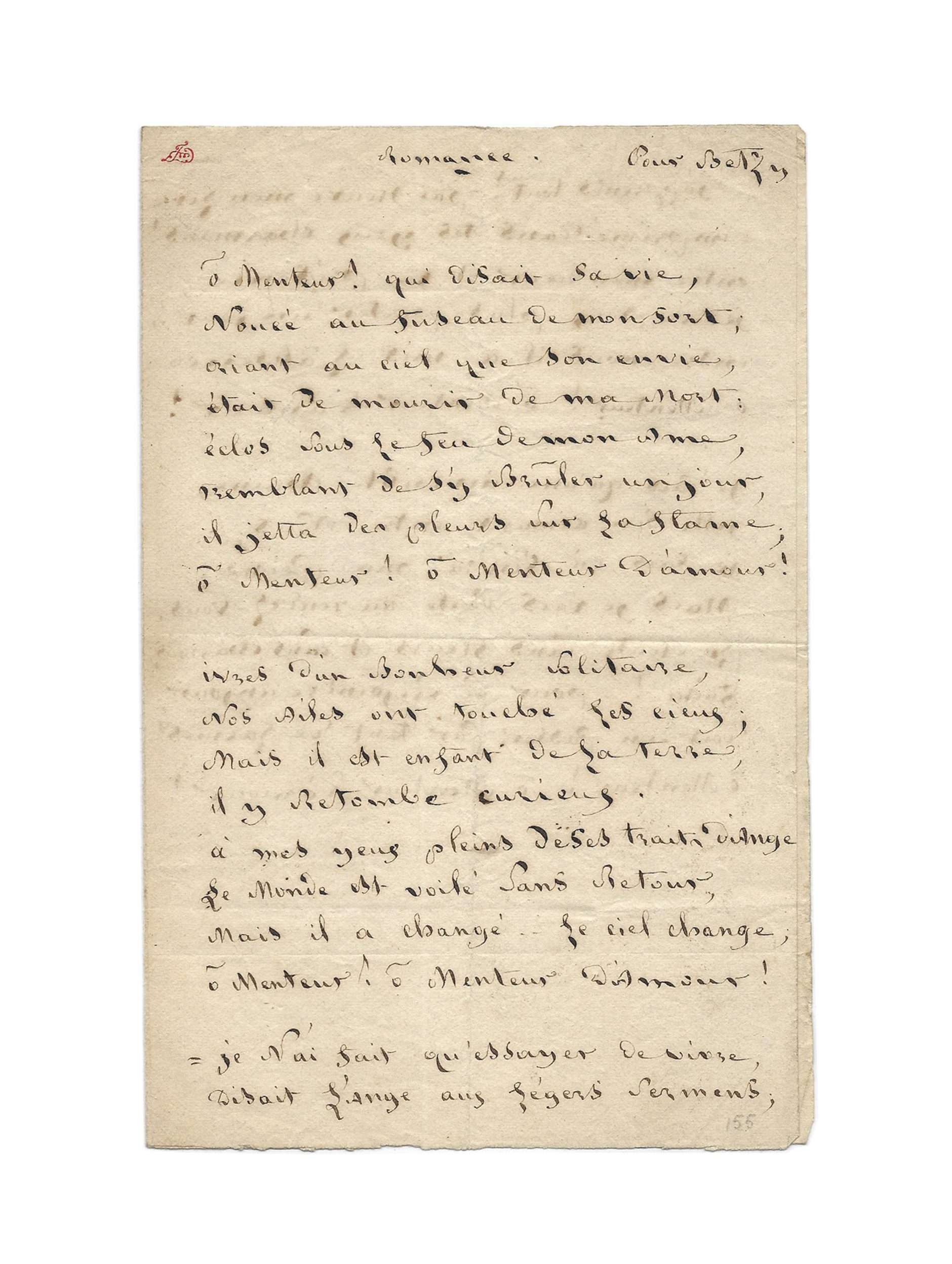DESBORDES-VALMORE, Marceline (1786-1859)
Autograph poem : « Romance » [Seule au Rendez-vous]
N.p.n.d [after 1833], 1 p. 1/2 in-8°
« Ô menteur ! qui disait sa vie / Nouée au fuseau de mon sort »
Fact sheet
DESBORDES-VALMORE, Marceline (1786-1859)
Autograph poem : « Romance » [Seule au Rendez-vous]
N.p.n.d [after 1833], 1 p. 1/2 in-8°
Slight missing bit on second folio (without affecting the text)
Formerly owned by Robert de Montesquiou and André Rodocanachi
One of Marceline Desbordes-Valmore’s most beautiful poems, from her collection Les Pleurs
Several unpublished variants are to be observed with the published version, including an inversion of stanzas 2 and 3
Entitled “Romance” here, the title of the poem as published is Seule au rendez-vous
« Ô menteur ! qui disait sa vie,
Nouée au fuseau de mon sort,
Criant au ciel que son envie
Était de mourir de ma mort :
Éclos sous le feu de mon ame,
Tremblant de s’y brûler un jour,
Il jeta des pleurs sur la flamme :
Ô menteur ! ô menteur d’amour !
Ivres d’un bonheur solitaire,
Nos ailes ont touché les cieux ;
Mais il est enfant de la terre ;
Il y retombe curieux.
à mes yeux plein de ses traits d’Ange
Le monde est voilé sans Retour ;
mais il a changé, le ciel change ;
Ô menteur ! ô menteur d’amour !
” Je n’ai fait qu’essayer de vivre,
Disait l’ange aux légers sermens :
” J’apprends tout ! j’ai trouvé mon livre
” Imprimé dans tes yeux charmans !
” Entre mon cœur et ta présence,
” Je ne peux plus porter un jour !… “
Entre nous il a mis l’absence :
Ô menteur ! ô menteur d’amour !
Je sais qu’une invisible chaîne
Jette son aimant entre nous ;
Je sais où finira ma peine ;
Mais je vais seule au rendez-vous.
La route sans fleurs et sans charmes
Fuira ! Pour se rejoindre un jour,
Doit-on passer par tant de larmes ?
Ô menteur ! ô menteur d’amour ! »
Although Desbordes-Valmore first entered the artistic life through a theatrical career, it was through poetry that she revealed all her genius, to the point of becoming a central figure of Romanticism. After the publication of his first collection Élégies, Marie et romances, in 1919, famous magazines and newspapers of the time showed a keen interest in her, such as La Muse Française. The poetess was immortalized by Verlaine in the enlarged edition of his book Les Poètes Maudits, published in 1888.
Married to the actor Prosper Valmore (1793-1881) in 1819, she became a wounded lover due to her brief extra-marital affair with the poet and journalist Henri de Latouche (1785-1851). They will almost always write to each other and almost never see each other again. While Latouche remains implicitly the dedicatee of many of Desbordes-Valmore’s poetic productions, he seems to appear here as a spectral figure.
This poem, written in the form of a lament, takes us back to the poet’s ethos of the Romantic movement. Marceline Desbordes-Valmore, whose voice seems to exhale in languid sighs, apostrophizes her suitor who, with fatalistic accents, ends up escaping her. Seule au rendez-vous is from the poetess’s most famous collection: Les Pleurs, published in 1833. From the point of view of metrics, this is four eighths in cross-rhyming octosyllables. Each end of the stanza is reinforced by an accusatory anaphora.
Provenance:
Robert de Montesquiou collection
André Rodocanachi collection
Bibliography:
Œuvres poétiques, éd. Marc Bertrand, Jacques André, p. 222-223 (Several variants with the published text mentioned above)
